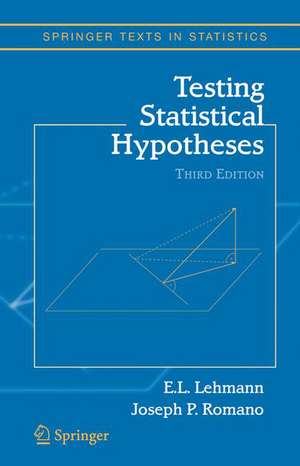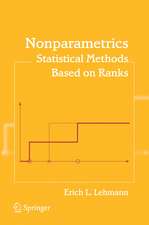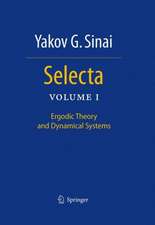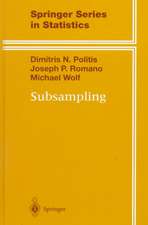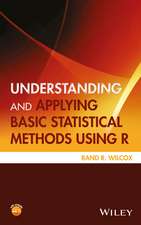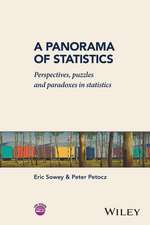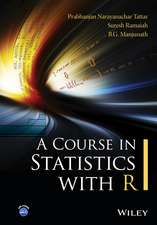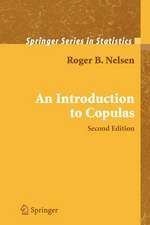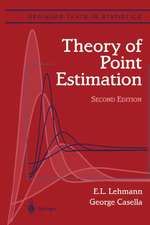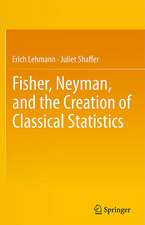Testing Statistical Hypotheses: Springer Texts in Statistics
Autor Erich L. Lehmann, Joseph P. Romanoen Limba Engleză Hardback – 25 aug 2008
| Toate formatele și edițiile | Preț | Express |
|---|---|---|
| Paperback (1) | 495.59 lei 6-8 săpt. | |
| Springer – 19 noi 2010 | 495.59 lei 6-8 săpt. | |
| Hardback (1) | 543.08 lei 38-44 zile | |
| Springer – 25 aug 2008 | 543.08 lei 38-44 zile |
Din seria Springer Texts in Statistics
-
 Preț: 400.60 lei
Preț: 400.60 lei - 15%
 Preț: 559.21 lei
Preț: 559.21 lei - 18%
 Preț: 903.62 lei
Preț: 903.62 lei - 20%
 Preț: 764.93 lei
Preț: 764.93 lei - 20%
 Preț: 643.55 lei
Preț: 643.55 lei - 20%
 Preț: 717.71 lei
Preț: 717.71 lei - 13%
 Preț: 486.97 lei
Preț: 486.97 lei - 20%
 Preț: 633.82 lei
Preț: 633.82 lei - 20%
 Preț: 697.48 lei
Preț: 697.48 lei - 15%
 Preț: 676.86 lei
Preț: 676.86 lei - 15%
 Preț: 621.10 lei
Preț: 621.10 lei - 20%
 Preț: 700.51 lei
Preț: 700.51 lei - 18%
 Preț: 743.11 lei
Preț: 743.11 lei - 18%
 Preț: 695.29 lei
Preț: 695.29 lei -
 Preț: 253.64 lei
Preț: 253.64 lei - 17%
 Preț: 525.27 lei
Preț: 525.27 lei - 17%
 Preț: 428.39 lei
Preț: 428.39 lei - 19%
 Preț: 571.81 lei
Preț: 571.81 lei - 20%
 Preț: 567.30 lei
Preț: 567.30 lei -
 Preț: 359.54 lei
Preț: 359.54 lei -
 Preț: 477.28 lei
Preț: 477.28 lei - 20%
 Preț: 570.35 lei
Preț: 570.35 lei - 15%
 Preț: 650.86 lei
Preț: 650.86 lei - 19%
 Preț: 626.93 lei
Preț: 626.93 lei - 18%
 Preț: 948.29 lei
Preț: 948.29 lei -
 Preț: 500.46 lei
Preț: 500.46 lei - 18%
 Preț: 746.59 lei
Preț: 746.59 lei -
 Preț: 403.75 lei
Preț: 403.75 lei -
 Preț: 403.37 lei
Preț: 403.37 lei -
 Preț: 394.71 lei
Preț: 394.71 lei - 18%
 Preț: 946.69 lei
Preț: 946.69 lei - 15%
 Preț: 578.67 lei
Preț: 578.67 lei - 15%
 Preț: 702.54 lei
Preț: 702.54 lei -
 Preț: 407.01 lei
Preț: 407.01 lei - 18%
 Preț: 895.89 lei
Preț: 895.89 lei - 15%
 Preț: 600.80 lei
Preț: 600.80 lei - 23%
 Preț: 684.78 lei
Preț: 684.78 lei - 15%
 Preț: 595.86 lei
Preț: 595.86 lei -
 Preț: 423.18 lei
Preț: 423.18 lei - 15%
 Preț: 656.10 lei
Preț: 656.10 lei - 15%
 Preț: 682.90 lei
Preț: 682.90 lei - 18%
 Preț: 814.43 lei
Preț: 814.43 lei -
 Preț: 402.76 lei
Preț: 402.76 lei -
 Preț: 408.54 lei
Preț: 408.54 lei
Preț: 543.08 lei
Preț vechi: 670.47 lei
-19% Nou
Puncte Express: 815
Preț estimativ în valută:
103.93€ • 108.11$ • 85.80£
103.93€ • 108.11$ • 85.80£
Carte tipărită la comandă
Livrare economică 10-16 aprilie
Preluare comenzi: 021 569.72.76
Specificații
ISBN-13: 9780387988641
ISBN-10: 0387988645
Pagini: 804
Ilustrații: XIV, 786 p.
Greutate: 1.36 kg
Ediția:3rd ed. 2005. Corr. 2nd printing 2008
Editura: Springer
Colecția Springer
Seria Springer Texts in Statistics
Locul publicării:New York, NY, United States
ISBN-10: 0387988645
Pagini: 804
Ilustrații: XIV, 786 p.
Greutate: 1.36 kg
Ediția:3rd ed. 2005. Corr. 2nd printing 2008
Editura: Springer
Colecția Springer
Seria Springer Texts in Statistics
Locul publicării:New York, NY, United States
Public țintă
ResearchDescriere
The Third Edition of Testing Statistical Hypotheses brings it into consonance with the Second Edition of its companion volume on point estimation (Lehmann and Casella, 1998) to which we shall refer as TPE2. We won’t here comment on the long history of the book which is recounted in Lehmann (1997) but shall use this Preface to indicate the principal changes from the 2nd Edition. The present volume is divided into two parts. Part I (Chapters 1–10) treats small-sample theory, while Part II (Chapters 11–15) treats large-sample theory. The preface to the 2nd Edition stated that “the most important omission is an adequate treatment of optimality paralleling that given for estimation in TPE.” We shall here remedy this failure by treating the di?cult topic of asymptotic optimality (in Chapter 13) together with the large-sample tools needed for this purpose (in Chapters 11 and 12). Having developed these tools, we use them in Chapter 14 to give a much fuller treatment of tests of goodness of ?t than was possible in the 2nd Edition, and in Chapter 15 to provide an introduction to the bootstrap and related techniques. Various large-sample considerations that in the Second Edition were discussed in earlier chapters now have been moved to Chapter 11.
Cuprins
The General Decision Problem.- The Probability Background.- Uniformly Most Powerful Tests.- Unbiasedness: Theory and First Applications.- Unbiasedness: Applications to Normal Distributions.- Invariance.- Linear Hypotheses.- The Minimax Principle.- Multiple Testing and Simultaneous Inference.- Conditional Inference.- Basic Large Sample Theory.- Quadratic Mean Differentiable Families.- Large Sample Optimality.- Testing Goodness of Fit.- General Large Sample Methods.
Recenzii
From the reviews of the third edition:
"This new edition of the classic and fundamental text on the theory of testing hypotheses is an essential addition to the bookshelf of mathematical statisticians." Short Book Reviews of the International Statistical Institute, December 2005
"What I like much about this book is its illustrative language and the numerous examples that make it easier to understand the complex matter presented. The comprehensible notation and the excellent structure further add to the readability of this book."Biometrics, March 2006
"The third edition of TSH retains much of the same focus as the second edition...The quality of the new material alone justifies the publication of a third edition to a book already well suited. As readers of the earlier editions have come to expect, TSH contains an enormous number of examples, problems, and ideas. The writing and presentation are excellent." Journal of the American Statistical Association, June 2006
"This is the third edition of a famous book which was first published in 1959. The first rigorous exposition to the theory of testing for any student of statistics has been invariably through this masterpiece. … Needless to say, this book continues to be the benchmark in the rigorous treatment of testing of hypothesis. The new chapters on the asymptotic behaviour of most of the popular tests is a true value addition." (Arup Bose, Sankhya, Vol. 67 (4), 2005)
"This is a revised and expanded version of the well-known second edition from 1986 … . The exposition is clear and sufficiently rigorous. … With this edition ‘Testing Statistical Hypothesis’ will undoubtedly continue to be the standard graduate level textbook on statistical testing." (R. Schlittgen, Zentralblatt MATH, Vol. 1076, 2006)
"This monograph under review is the third edition … of Erich L. Lehmann’s classical graduate text on ‘Testing statistical hypotheses’. … the second edition from 1986 has comprehensively been reorganized … . Additional insight into the historical background and recent developments is given … . More than 1,000 original references are provided. … an excellent and demanding treatment of modern statistical test theory. There is no doubt that it remains and will even more be used as a standard monograph … ." (J. Steinebach, Metrika, Vol. 64, 2006)
"This new edition of the classic and fundamental text on the theory of testing hypotheses is an essential addition to the bookshelf of mathematical statisticians." Short Book Reviews of the International Statistical Institute, December 2005
"What I like much about this book is its illustrative language and the numerous examples that make it easier to understand the complex matter presented. The comprehensible notation and the excellent structure further add to the readability of this book."Biometrics, March 2006
"The third edition of TSH retains much of the same focus as the second edition...The quality of the new material alone justifies the publication of a third edition to a book already well suited. As readers of the earlier editions have come to expect, TSH contains an enormous number of examples, problems, and ideas. The writing and presentation are excellent." Journal of the American Statistical Association, June 2006
"This is the third edition of a famous book which was first published in 1959. The first rigorous exposition to the theory of testing for any student of statistics has been invariably through this masterpiece. … Needless to say, this book continues to be the benchmark in the rigorous treatment of testing of hypothesis. The new chapters on the asymptotic behaviour of most of the popular tests is a true value addition." (Arup Bose, Sankhya, Vol. 67 (4), 2005)
"This is a revised and expanded version of the well-known second edition from 1986 … . The exposition is clear and sufficiently rigorous. … With this edition ‘Testing Statistical Hypothesis’ will undoubtedly continue to be the standard graduate level textbook on statistical testing." (R. Schlittgen, Zentralblatt MATH, Vol. 1076, 2006)
"This monograph under review is the third edition … of Erich L. Lehmann’s classical graduate text on ‘Testing statistical hypotheses’. … the second edition from 1986 has comprehensively been reorganized … . Additional insight into the historical background and recent developments is given … . More than 1,000 original references are provided. … an excellent and demanding treatment of modern statistical test theory. There is no doubt that it remains and will even more be used as a standard monograph … ." (J. Steinebach, Metrika, Vol. 64, 2006)
Notă biografică
E.L. Lehmann is Professor of Statistics Emeritus at the University of California, Berkeley. He is a member of the National Academy of Sciences and the American Academy of Arts and Sciences, and the recipient of honorary degrees from the University of Leiden, The Netherlands and the University of Chicago. He is the author of Elements of Large-Sample Theory and (with George Casella) he is also the author of Theory of Point Estimation, Second Edition.
Joseph P. Romano is Professor of Statistics at Stanford University. He is a recipient of a Presidential Young Investigator Award and a Fellow of the Institute of Mathematical Statistics. He has coauthored two other books, Subsampling with Dimitris Politis and Michael Wolf, and Counterexamples in Probability and Statistics with Andrew Siegel.
Joseph P. Romano is Professor of Statistics at Stanford University. He is a recipient of a Presidential Young Investigator Award and a Fellow of the Institute of Mathematical Statistics. He has coauthored two other books, Subsampling with Dimitris Politis and Michael Wolf, and Counterexamples in Probability and Statistics with Andrew Siegel.
Textul de pe ultima copertă
The third edition of Testing Statistical Hypotheses updates and expands upon the classic graduate text, emphasizing optimality theory for hypothesis testing and confidence sets. The principal additions include a rigorous treatment of large sample optimality, together with the requisite tools. In addition, an introduction to the theory of resampling methods such as the bootstrap is developed. The sections on multiple testing and goodness of fit testing are expanded. The text is suitable for Ph.D. students in statistics and includes over 300 new problems out of a total of more than 760.
E.L. Lehmann is Professor of Statistics Emeritus at the University of California, Berkeley. He is a member of the National Academy of Sciences and the American Academy of Arts and Sciences, and the recipient of honorary degrees from the University of Leiden, The Netherlands and the University of Chicago. He is the author of Elements of Large-Sample Theory and (with George Casella) he is also the author of Theory of Point Estimation, Second Edition.
Joseph P. Romano is Professor of Statistics at Stanford University. He is a recipient of a Presidential Young Investigator Award and a Fellow of the Institute of Mathematical Statistics. He has coauthored two other books, Subsampling with Dimitris Politis and Michael Wolf, and Counterexamples in Probability and Statistics with Andrew Siegel.
E.L. Lehmann is Professor of Statistics Emeritus at the University of California, Berkeley. He is a member of the National Academy of Sciences and the American Academy of Arts and Sciences, and the recipient of honorary degrees from the University of Leiden, The Netherlands and the University of Chicago. He is the author of Elements of Large-Sample Theory and (with George Casella) he is also the author of Theory of Point Estimation, Second Edition.
Joseph P. Romano is Professor of Statistics at Stanford University. He is a recipient of a Presidential Young Investigator Award and a Fellow of the Institute of Mathematical Statistics. He has coauthored two other books, Subsampling with Dimitris Politis and Michael Wolf, and Counterexamples in Probability and Statistics with Andrew Siegel.
Caracteristici
Summarizes developments in the field of hypotheses testing
Optimality considerations continue to provide the organizing principle, but are now tempered by a much stronger emphasis on the robustness properties of the resulting procedures
An essential reference for any graduate student in statistics
Includes supplementary material: sn.pub/extras
Optimality considerations continue to provide the organizing principle, but are now tempered by a much stronger emphasis on the robustness properties of the resulting procedures
An essential reference for any graduate student in statistics
Includes supplementary material: sn.pub/extras
